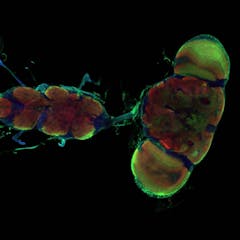
Articles sur Schizophrenia
Affichage de 1 à 20 de 105 articles

The experience of hearing voices can be very different from person to person, and can change over time. They can be comforting or very distressing.

A lack of dopamine seems to directly cause social problems.

Extreme heat will continue to affect Canada, but the negative impacts on the most vulnerable, including those living with mental illness, can be reduced by taking steps to ensure healthier cities.

‘Hervs’ date back hundreds of thousands of years – and play an important role in regulating genes.

A highly unusual new case is giving scientists insights about what causes illusions of facial distortion

Alison Watt’s grandmother was diagnosed with ‘puerperal insanity’ and institutionalised not long after giving birth to her father. He didn’t meet her – or know she was alive – until his early 20s.

Humans have attempted to understand and treat mental illness for centuries – from ancient Greek medicine, Middle Ages exorcisms and the rise of asylums, to modern medical breakthroughs.

The international Hearing Voices Movement has spent the past decades campaigning to destigmatise a surprisingly common phenomenon.

Learning new rules requires the suppression of old ones. A better understanding of the brain circuits involved in behavioral adaptation could lead to new ways to treat schizophrenia and bipolar disorder.

Why was Susanna Kaysen really hospitalised? Her memoir Girl, Interrupted turns 30 this year. It investigates whether she was ‘mad’, or medicalised for a ‘chaotic’ life that defied gender norms.

Based on Anne Deveson’s 1991 memoir about her son’s experience with schizophrenia, this play can be achingly sad. But it also offers hope.

Cannabis use is linked to poorer memory, attention and mental health.

The recent review found that both high and low frequency cannabis users were six times more likely to develop schizophrenia.

Early intervention programs for young people with psychosis might cost more initially, and require more intensive support for longer periods, but they’re worth the investment.

Conservatorships significantly restrict people’s ability to make decisions for themselves. Other options can provide support while maintaining respect for autonomy.

Blood samples help doctors know whether a treatment is effective or not – and this device can provide this information almost instantly.

Adaptable neurons are tied to learning and memory but also to neurological disorders. By studying fruit flies, researchers found a mechanism that controls neuroplasticity.

People with schizophrenia are almost three times more likely to die from COVID-19 than those without the serious mental illness, making it second only to age as a risk factor for mortality.

Research on the genetic basis of mental illness has so far largely excluded anyone who is not of European heritage.

Media reporting often unfairly stigmatises people with mental illness and promotes the stereotype that mental illness causes violent behaviour. New guidelines offer tips for more responsible reporting.
